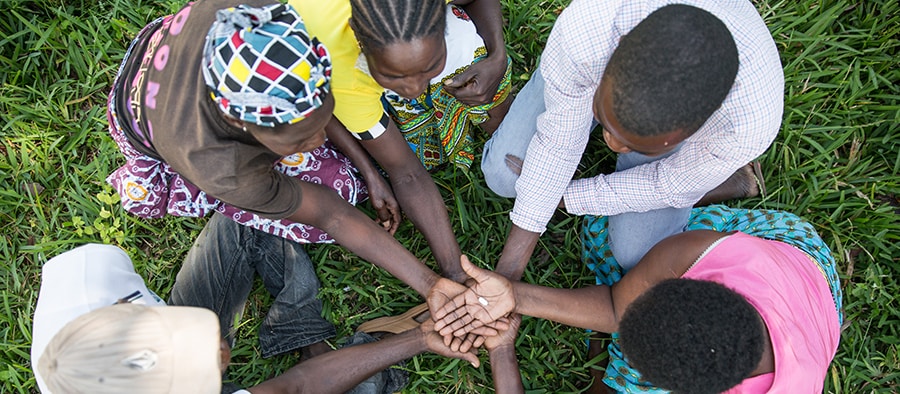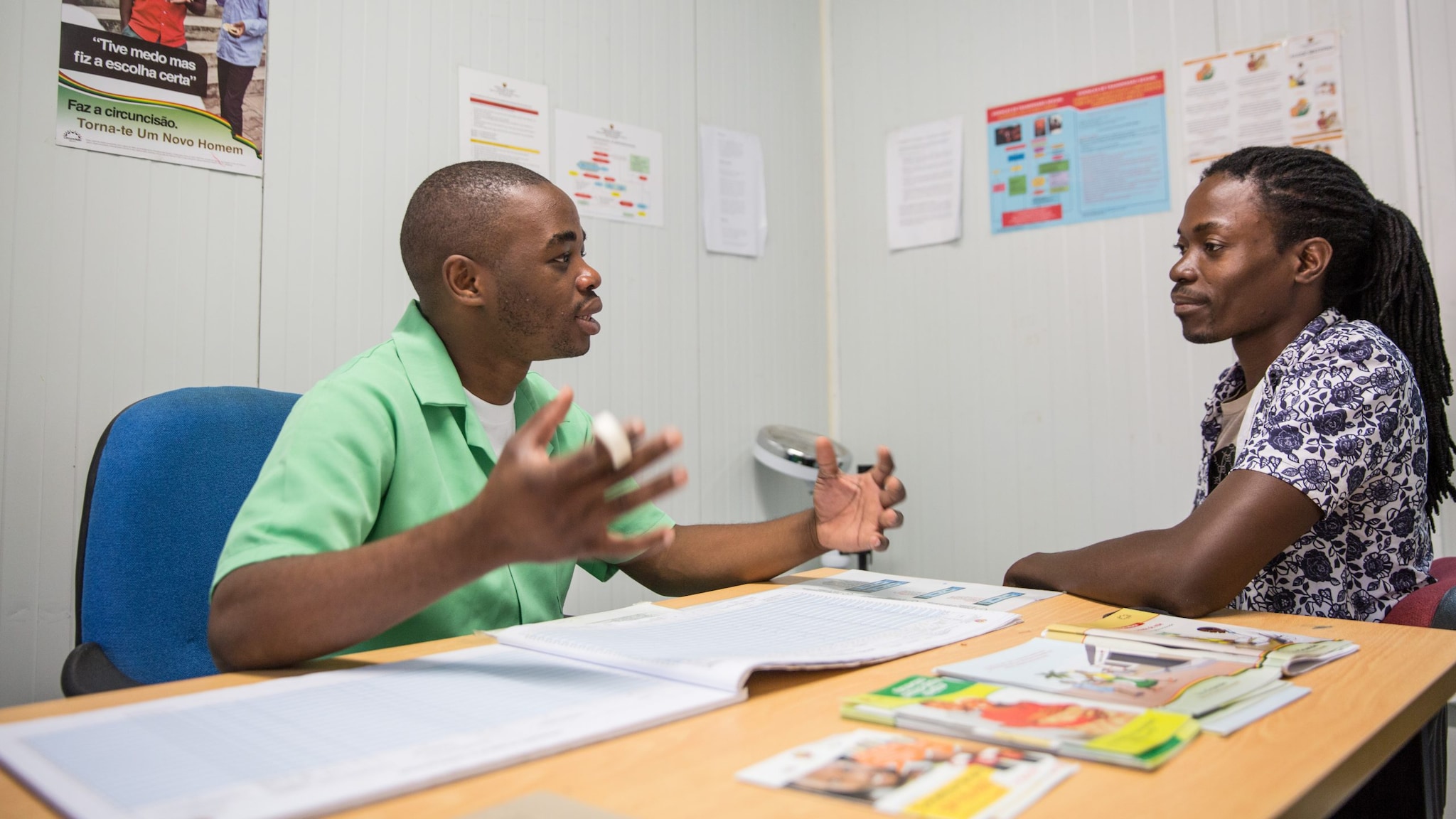CDC in Mozambique

Community Adherence and Support Groups increase access to antiretroviral treatment (ART) and reduce the number of times patients need to visit health facilities to pick up ART. Photo by Ricardo Franco/CDC.
The Centers for Disease Control and Prevention (CDC) established an office in Mozambique in 2000 with an initial focus on surveillance and prevention of mother-to-child transmission of HIV. The launch of the U.S. President’s Emergency Plan for AIDS Relief (PEPFAR) in 2004 and the U.S. President’s Malaria Initiative (PMI) in 2005 expanded CDC’s work in Mozambique. CDC works with the Ministry of Health (MOH) to address HIV, tuberculosis (TB), malaria, COVID-19, and influenza. CDC also supports strengthening of laboratory, disease surveillance, and workforce capacities to respond to disease outbreaks.
Health Systems Strengthening
CDC works with the MOH to establish and strengthen laboratory networks, surveillance systems, public health infrastructure, and workforce capacity. These public health assets are essential for delivering high-quality HIV/TB prevention and treatment services and responding to the COVID-19 pandemic. CDC works with the MOH to strengthen the national health system by:
- Developing and supporting electronic health information systems
- Enhancing the availability, accessibility, quality, and use of service-delivery data
- Supporting strengthened capacity, sustainability, and effectiveness of Human Resources for Health (HRH)
- Strengthening HIV and TB laboratory systems through enhanced diagnostics and treatment monitoring, workforce development, information systems, supply chain, policy development, and quality improvement
- Expanding the health management information systems infrastructure
- Designing systems for routine program monitoring and integrating disease-specific programs
- Conceptualizing research and conducting behavioral surveys and disease surveillance
- Promoting a country-owned and financially sustainable health system
CDC supports health systems strengthening through enhanced human resources for health, public health infrastructure, electronic patient tracking system, and laboratory systems
In 2020, the CDC-supported Regional TB Reference Laboratory in Nampula province became the seventh laboratory to receive international accreditation for the ISO 15189 quality standards
Field Epidemiology Training Program (FETP)
CDC helped Mozambique establish an FETP in 2010 to strengthen the workforce’s capacity to investigate and respond to disease outbreaks. FETP strengthens participants’ skills in applied epidemiology, laboratory management, data collection, and translating data into evidence-based action. As part of their training, FETP fellows also support the MOH with HIV and TB surveillance, monitoring, and evaluation.
Since 2010, nearly 60 health professionals have completed the FETP in Mozambique
As of 2021, FETP graduates responded to more than 40 disease outbreaks, including measles, cholera, rabies, typhoid fever, vaccine-derived polio, malaria, and dengue
CDC and FETP graduates support emergency response efforts for natural disasters, such as Cyclone Ana in February 2022
Since 2020, FETP graduates have supported the national COVID-19 response through case investigation, community-level mortality surveillance, and assessments of contact tracing effectiveness and compliance with quarantine and isolation
COVID-19
The first case of COVID-19 was confirmed in Mozambique in March 2020. CDC partnered with the MOH and National Institute of Health (INS) to develop the overall strategy, operational plan, and budget for Mozambique’s COVID-19 response. CDC staff also provide subject matter expertise across technical working groups that guide the response. CDC supports efforts to:
- Strengthen local capacity to prevent, detect, and respond to COVID-19 by training staff on best practices, procuring personal protective equipment, and establishing functional hand washing facilities in clinics
- Decrease transmission of COVID-19 in communities, across borders, and in healthcare facilities
- Leverage existing laboratory systems to diagnose COVID-19
- Minimize disruptions to essential health services and adapt comprehensive care approaches to maintain quality of care for people living with HIV and TB during the pandemic
- Develop national COVID-19 clinical guidelines
To expand laboratory testing capabilities, CDC helped increase staffing, training, reagent supply, and access to equipment for timely and accurate COVID-19 diagnostics
CDC helped adapt the existing laboratory information system for COVID-19 sample referral, result transmission, and generation of daily national caseload reports
To reduce disease transmission among healthcare workers and patients, CDC helped establish handwashing facilities in 48 clinics in areas with higher risk of COVID-19 surges
HIV
HIV is a leading cause of mortality and morbidity in Mozambique and affects 13% of the adult population. Through PEPFAR, CDC partners with the MOH to build a sustainable national HIV response program that is aligned with UNAIDS global goals for HIV epidemic control. CDC and the MOH collaborate across a broad range of HIV prevention and treatment activities, including:
- Advising and developing policies, guidelines, training materials, tools, and monitoring and evaluation programs
- Developing evidence-based programs that focus on populations living with higher risk of HIV infection
- Advising on effective HIV case-finding policies, strategies, and programs such as index-case and self-testing, linking people to antiretroviral treatment, and viral load testing
- Optimizing client-centered treatment regimens, service delivery, counseling, and patient retention
- Preventing, diagnosing, and treating common comorbidities, such as TB and cervical cancer
- Enhancing early infant diagnosis and reducing mother-to-child transmission of HIV
- Scaling-up HIV pre-exposure prophylaxis (PrEP)
- Supporting voluntary male medical circumcision (VMMC) to reduce transmission of HIV and other sexually transmitted infections
- Helping to establish quality assurance and medical ethical standards for VMMC
- Implementing the Determined, Resilient, Empowered, AIDS-Free, Mentored and Safe (DREAMS) program for adolescent girls and young women
- Expanding gender-based violence prevention activities within HIV/AIDS programs
- Supporting community-based efforts to reduce HIV-related stigma and discrimination

CDC is committed to increasing male engagement in health services to reduce risk of HIV infection in Mozambique. Photo by Ricardo Franco/CDC
As of December 2021, PEPFAR supported more than 1.6 million people living with HIV to receive antiretroviral treatment (ART) in Mozambique
In 2021, CDC implementing partners offered safe voluntary medical male circumcision services to more than 46,000 men to help prevent HIV infection
In 2021, more than 10,000 people living with higher risk of HIV infection received Pre-exposure HIV Prophylaxis (PrEP) in CDC-supported health facilities
In 2021, CDC and implementing partners ensured that 99% of pregnant women accessing antenatal care in CDC-supported provinces knew their HIV status and 98% were linked to treatment
Due to the high rates of pregnant women knowing their HIV status and being linked to treatment, the proportion of infants who were exposed to and then diagnosed with HIV decreased from 5.3% to 3.8%
CDC supports an electronic patient tracking system at nearly 630 PEPFAR-supported sites
HIV viral load coverage among people living with HIV increased from 62% to 77% in 2021 due to enhanced laboratory systems
In 2021, CDC and local partners supported the MOH to launch the third national, household HIV prevalence survey to assess the state of the HIV epidemic in Mozambique
Tuberculosis (TB)
Mozambique is one of the countries most affected by TB in the world. Based on 2020 data from the WHO and MOH, approximately 12,400 TB-related deaths occur in Mozambique each year. The HIV epidemic complicates the TB epidemic, with almost half of annual TB-related annual deaths occurring among people living with HIV. For more than 10 years, CDC has assisted the National TB Program in Mozambique with early diagnosis, integration of TB and HIV services, and diagnosis and treatment of drug-resistant TB. CDC partners also work with people who work in mines, people who are imprisoned, and healthcare workers to increase rapid detection of TB and HIV. CDC supports the MOH and INS with various TB activities, including:
- Infection prevention and control plans in health facilities
- Implementation of the Cough Officers program to enhance case identification and reduce TB transmission in health facilities
- Safety and quality improvement of laboratories through the national Strengthening Laboratory Management Toward Accreditation (SLMTA) program, locally known as FOGELA
- Implementation of the external quality assessment components that enhance capacity and flexibility in TB diagnostics and drug resistance
- Providing TB preventive therapy (TPT) for all people living with HIV and screening and treatment for TB and HIV coinfection
- Technical collaboration on national policies, strategies, training, health communications, mentoring, and supervision
Since March 2020, CDC’s efforts contributed to a 20% increase of TB preventive treatment (TPT) coverage among people living with HIV and a 41% increase of TPT completion
Since March 2020, TB screening among people living with HIV increased by 3%
100% of TB patients were tested for HIV and 97% of HIV-positive TB patients started ART since March 2020
CDC and partners’ efforts contributed to a threefold decrease of HIV/TB coinfections in Mozambique between 2010 and 2020
Malaria
Through PMI, CDC assigned a resident advisor to Mozambique to support the MOH with prevention and control activities that reduce malaria-related morbidity and mortality. CDC provides technical advice, and research and programmatic support. CDC and PMI strategically emphasize indoor residual spraying and mosquito monitoring, case management and drug efficacy monitoring, drug-based prevention, supply chain management, and social and behavior change.
CDC supported development of the 2017-2022 national malaria strategy
CDC partnered with the national malaria control program to develop response plans for humanitarian and natural emergencies
To reduce malaria morbidity and mortality among people who are internally displaced, CDC supported a three-round Mass Drug Administration (MDA) campaign in Cabo Delgado province in 2020
Influenza
Influenza viruses require continued vigilance to protect the world from seasonal influenza and novel strains that could trigger a pandemic such as COVID-19. CDC has worked with the Government of Mozambique to help build surveillance and laboratory capacity to detect and respond to influenza. Mozambique participates in the WHO’s External Quality Assessment Project (EQAP) for influenza laboratories. By monitoring quality and performance standards, the EQAP helps strengthen diagnostic capacity and preparedness to respond to influenza outbreaks worldwide.
- 21 U.S. Assignees
- 73 Locally Employed
- Population: > 31.25 million
- Per capita income: $1,250
- Life expectancy: F 57 / M 54 years
- Infant mortality rate: 49/1,000 live births
Sources:
World Bank 2020, Mozambique
Population Reference Bureau 2021, Mozambique